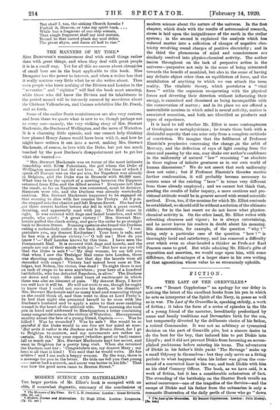MODERN SCIENCE AND MATERIALISM.t Tax larger portion of Mr. Elliot's
book is occupied with an able, if somewhat dogmatic, summary of the conclusions of • The Manners of My Time. By C. L. H. Dempster. London : Grant Richards. [10a ed. net. t Modem Souses and Materialism. By Hugh Elliot. London: LeegMaeS. [7s. ed. net I modem science about the nature of the universe. In the first chapter, which deals with the results of astronomical research, stress is laid upon the insignificance of the earth in the stellar system ; in the second Is explained the analysis which has reduced matter into a collection of charges of negative elec- tricity revolving round charges of positive electricity ; and in the third the phenomena of mind and consciousness ara similarly resolved into physico-chemical activity. The author insists throughout on the lack of purposive action in the universe—purposive not only in the sense of being orientated towards the benefit of mankind, but also in the sense of having any definite object other than an equilibrium of force, and the annihilation of anything to which we can attach the term reality. The vitalistic theory, which postulates a " vital force " within the organism co-operating with the physical forces and diverting their direction without influencing their energy, is examined and dismissed as being incompatible with the conservation of matter ; and in its place we are offered a materialistic monism in which mind is neural activity, matter is associated sensation, and both are identified as products and types of experience.
It is hard to tell whether Mr. Elliot is more contemptuous of theologians or metaphysicians ; he treats them both with a disdainful asperity that can arise only from a complete certitude of conviction. We imagine that the fulfilment of Professor Einstein's prophecies concerning the change ,in the orbit of Mercury, and the deflection of rays of light coming from the stars and passing by the sun, may shake our author's confidence in the uniformity of natural " law " remaining " as absolute in these regions of infinite greatness as in our own world of human dimensions." We do not assert that such uniformity does not exist ; but if Professor Einstein's theories receive further confirmation, it will probably become necessary to restate some of the existing " laws " in terms very different from those already employed ; and we cannot but think that, pending the results of fuller inquiry, a more cautious and pro- visional attitude would be in greater accord with sound scientific method. Even, too, if the monism for which Mr. Elliot contends be established, we should still be without a solution of the ultimate riddle ; for in the last resort we do not know 'what physico- chemical activity is. On the other hand, Mr. Elliot writes with refreshing clearness and vigour ; he is always entertaining, and he never leaves his readers in doubt about his meaning. His demonstration, for example, of the question " why ? " being only a particular case of the question " how ? " is thoroughly lucid and satisfactory, and has removed a difficulty over which even so clear-headed a thinker as Profe.sor Karl Pearson came to grief. But while admiring Mr. Elliot's gifts of exposition and assertion, we would urge upon him, with some diffidence, the advantages of a larger share in his own writing of that agnosticism whose value he so strenuously upholds.


































 Previous page
Previous page